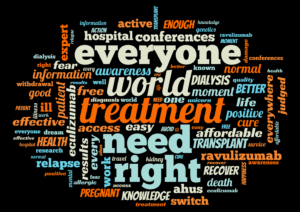Article 343
8 May 2020
When the COVID-19 pandemic becomes history, as it will be one day ,those remembering it will do so through their own perception of what happened. Much as was the case for those enduring the world changing events of the 1940s. Even though there will be “official” records and “biased” media accounts of what happened, people will remember it for different reasons.
Although there was some noise about it in January, news from China had not really permeated my consciousness at that time. Even if I had heard the news about a friend spending a week in hospital in Northern Italy with pneumonia when he was ill in January, it would not have registered any link. It remains just a coincidence even now.
I began to take notice of this emerging threat when considering a planned trip to the USA to meet with Alexion Pharmaceuticals. It had then become relevant to a decision on whether I should go. I had begun to realise that my age group was very vulnerable to this disease , which I had learned was “coronavirus” or “COVID-19”. Gathering information about it would influence my decision. The likelihood of infection, the seriousness of the symptoms to be endured if infected badly, and the possibility of death from complications tend to concentrate the mind.
The trip was called off just days ahead of Government advice not to make such journeys. It was February and life was changing.
Ironically the meeting which had been called off was about a potential collaboration with Alexion on research to answer the aHUS Patients Research Agenda question on whether undertaking familial genetic susceptibility testing for aHUS is better than not doing so, and was there any utility from it?
I am one of perhaps only a handful of people to have known my genetic susceptibility to aHUS for over 20 years. In 1998. having been tested, I was told that I had what I would later find out was the first known aHUS predisposing genetic mutation in Complement. It would put me at risk of onset if circumstances were right.
The utility of that result influenced a decision about me being a donor of my kidney for a transplant. The medical advice was not to donate because of risk of “de novo” aHUS (although today with an additional genetic test that advice might be different).
Then it was just a case of very occasionally wondering in the years that followed whether something else might trigger the disease as it had in other members of my immediate family. Though again as I discovered later, there was a much broader family with whom I had shared an aHUS susceptibility, because of a common ancestor from many hundreds of years ago.
Now it was relevant again and I was aware.
Using the model of TMA classification by Aigner Group in Vienna, in November last year I wrote a blog* for this website which set out the scope of “new aHUS“ and who would aHUS advocates advocate for based on this new classification.. One subset of the TMAs was infection TMA.
(* https://ahusallianceaction.org/ahus-is-its-end-really-nigh-3/ )
Most people know about e coli infection ;but less about it triggering TMA, and some fewer of streptococcal pneumoniae triggering TMA. There were other bacterial and viral infections too. Having an infection TMA did not mean it was aHUS , unless there was also some hampering of Complement function. That would be rare and unlucky. Rare trigger and rare genetic susceptibility. Very unlikely.
But that it just what happened to an uncle of mine. The infection in his case was MRSA. It led to pneumonia and sepsis, triggering of aHUS, kidney failure, death and “Bob’s your uncle!”( an English phrase to end a sequence of related events similar to the ” et voila” in French and ” as easy as pie” in the USA). Except Bob was my uncle’s name , he was in his 70s and none of the potential triggering hits he must have encountered throughout his lifetime had been catastrophic, until then.

Although in early March there was little specific to aHUS in the social media to alarm anyone, there was some explanation emerging about how serious a COVID19 infection could be. Firstly, it could trigger an excessive innate immune system response. Mentions of “cytokines” “interferons” “interleukins” (whatever they were!) were at play, but no mention of Complement.
That over active immune response could damage the lungs to allow bacterial infection in and lead to sepsis pneumonia and in some cases ( about 20% it is said) to acute renal failure. But then sepsis is a common disease in any year. An expert nephrologist even appeared on TV saying that kidneys became involved because the blood became “sticky”, the walls of the capilliaries in the kidney would be attacked and became filled up with “sludge”. Genetic Complement renal disorders are rare, so nothing to see here then.
Then something odd happened. A doctor in New York who specialised in eye disorders hit the news because he decided to carry out a trial of eculizumab for treating those COVID19 victims with the very serious problems. He thought controlling Complement by blocking C5 could reduce the inflammation and MAC response and give patients time to recover. I wrote a blog about it. I even wrote to the investigator, but, not unusually, I got no reply.
At about the same time, I had written to Alexion for its thoughts. Something was happening, but clearly nothing could be said. Alexion is surrounded by layers of regulatory legislation. Not even a response to my suggestion for compassionate provision for those rare individuals whose aHUS may be triggered by COVID 19 but who lived in countries that have no access to eculizumab. Hoping for some humanitarian gesture, I cited the example of the German E. coli outbreak 8 years ago when Alexion provided eculizumab to hundreds of HUS patients to see if would help. At that time German aHUS patients had not got access to eculizumab, but it was worth Alexion’s time and expense to do so.
So much of aHUS patient advocacy starts with a personal question about what to do and then one thing links to another and you end up advocating for people who you do not know and who do not know what is about to hit them. And you are powerless.
For Rare Disease Day this year fifty or so aHUS patients shared their personal aHUS visions for an awareness video. Although it was not the purpose of the video project, as I read the individual images appearing on Facebook the variability or similarity in their words used began to strike me.
Using a technique, I have used before, I took each contributor’s statement and put it in a “word cloud” generator. A word cloud is able to emphasise the words that are used more frequently by increasing the font size for them. Those similarities and shared vision elements can create a collective vision such the one which emerged.

I wrote a blog about it on Rare Disease Day (https://ahusallianceaction.org/a-global-ahus-patients-vision/ ) but it attracted little interest. Without knowing anything about who visits the website site, a count is made of what is viewed. The view count showed there was little appetite for a collective Global aHUS Patients Vision. Whether it was in English, French or Spanish it was very much ignored. That is what aHUS patient advocacy can be like.
Efforts thwarted , no replies, responses nor reactions.
You get used to it, no one is making you do it, and it is not about you anyway. But as is the case with aHUS itself it can take many hits before there is a break though, so it is a case of carry on carrying on or until, like many, you chose not to.
By April I not heard of anyone with a corona virus illness on setting with aHUS , nor anyone with aHUS being infected by the virus.Though I was aware of two aHUS research/clinicians who had onset with coronavirus , one in Bergamo, Italy and one in Newcastle Upon Tyne ,UK. Thankfully both of them have recovered from the illness and are back at work.
Furthermore one day someone, who you do not know, makes an unsolicited donation to the aHUS alliance charity to help defray the costs of keeping the organisation going.
Then on another day, Alexion announces that it has achieved an extended scope for eculizumab in USA and Germany for treating complications of COVID19.
And that it is starting a trial in May for ravulizumab to be used on 270 COVID-19 patients, a speculative investment as it did for E. coli patients 8 years ago.
Also the announcement mentions compassionate provision has been given to some patients. A humanitarian gesture?
And the cancelled meeting with Alexion about genetic testing and its utility was eventually held online via something called Zoom. A research collaboration was agreed and it will involve international aHUS genetic researchers/counsellors and aHUS families. ( Update: as the pandemic progressed Alexion decided to pull out of this collaboration and it ended- a disappointment but in advocacy you get used to it happening, win some lose some , you just carry )
Today it is VIctory in Europe Day. VE day recognises the cessation of the European element of a global conflict in the 1940s.
One day it will be VC Day when COVID19 is defeated globally.
Further off, the aHUS Patients Global Vision envisages a VaHUS Day. That will be a good day.
Something to reflect on this day in 2020.
Len Woodward, Director aHUS alliance Global Action

